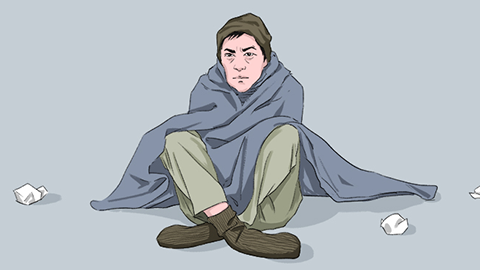Why does headache occur in the later stage of type A flu?
Generally speaking, "A-flu" refers to influenza A. Influenza A is a respiratory infectious disease caused by the influenza A virus. Headaches during the later stages of influenza A infection may be caused by sleep deprivation, dehydration, sinusitis, otitis media, viral meningitis, or other factors. If symptoms of influenza A appear, prompt medical attention should be sought and treatment followed as directed by a physician to prevent worsening of the condition and the development of complications. Detailed explanations are as follows:

1. Sleep Deprivation
During influenza A infection, patients often experience poor sleep quality due to symptoms such as fever and cough, which may lead to insufficient cerebral blood supply and neurological dysfunction, causing headaches. It is important to ensure adequate sleep, create a quiet and comfortable sleeping environment, and avoid staying up late.
2. Dehydration
Excessive fever or sweating during influenza A infection may cause fluid loss, leading to increased blood viscosity and cerebral vasoconstriction, which can result in headaches. It is important to maintain hydration by drinking adequate amounts of water or lightly salted water and to avoid beverages containing caffeine.
3. Sinusitis
Sinusitis is an inflammatory reaction of the sinus mucosa, usually caused by bacterial or viral infections. Sinusitis can cause increased pressure within the sinuses, resulting in headaches. It is typically accompanied by symptoms such as nasal congestion and purulent nasal discharge. Patients may take medications such as amoxicillin-clavulanate potassium tablets, budesonide nasal spray, and eucalyptus oil soft capsules under a doctor's guidance for treatment.
4. Otitis Media
The influenza A virus may infect the middle ear through the eustachian tube, causing otitis media. Otitis media can cause pressure changes in the middle ear, leading to headaches. It is typically accompanied by symptoms such as ear pain and hearing loss. Patients are advised to use medications such as cefradine capsules, ofloxacin ear drops, and acetaminophen tablets under a doctor's guidance for treatment.
5. Viral Meningitis
Influenza A virus continuously replicates in respiratory epithelial cells. If it enters the bloodstream, it can infect the central nervous system and cause viral meningitis. The inflammation may lead to meningeal congestion and edema, thereby compressing nerve endings and causing headaches. Associated symptoms may include fever, nausea, vomiting, and neck stiffness. Patients may take medications such as acyclovir tablets, dexamethasone sodium phosphate injection, and ibuprofen sustained-release capsules under medical guidance to alleviate symptoms.
Personal hygiene should be emphasized in daily life, including frequent handwashing, avoiding crowded places, and reducing the risk of viral infection.










